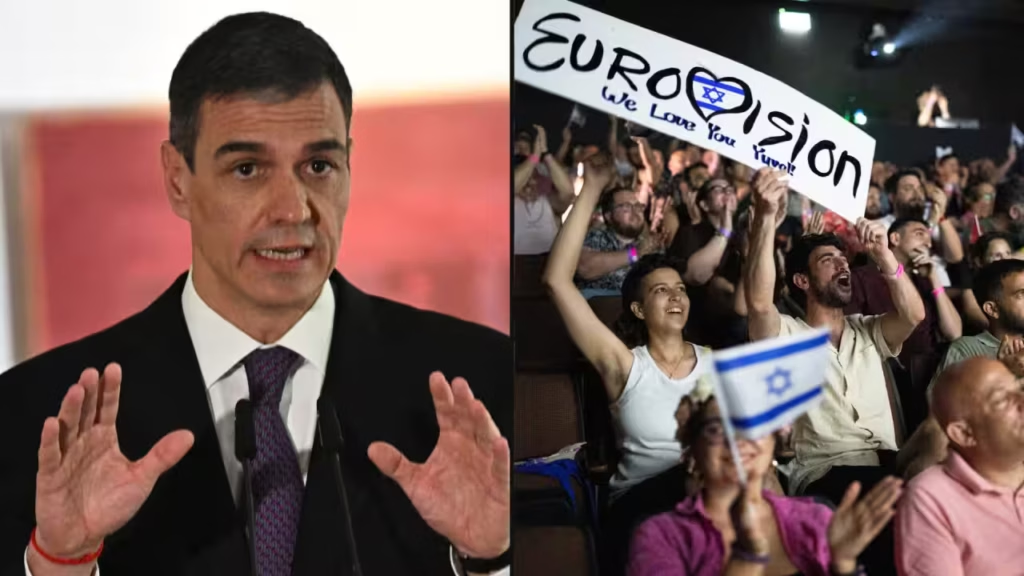MADRID — Spanish Prime Minister Pedro Sanchez has called for Israel’s exclusion from international cultural events, including the Eurovision Song Contest, over its ongoing military offensive in Gaza. Speaking at a conference in Madrid on Monday, Sanchez said cultural organizations must not adopt a double standard, drawing a parallel to Russia’s expulsion from global competitions following its 2022 invasion of Ukraine.

“We cannot allow double standards, not even in culture,” Sanchez said. “No one was shocked three years ago when Russia was excluded from Eurovision after its invasion of Ukraine. Israel should not be allowed to participate either.”
The Spanish Socialist leader, a consistent critic of Israeli policy in the occupied Palestinian territories, emphasized the need for the cultural sector to take a stand on democratic values and peace. He criticized artists and institutions who maintain “a bland, silent, equidistant” stance on global conflicts.
Israel’s Foreign Ministry has not issued a response to Sanchez’s remarks, which come amid intensifying scrutiny over the Israeli government’s handling of the war in Gaza.
The 2024 Eurovision finals, held this month in Basel, Switzerland, reignited controversy as Israeli contestant Yuval Raphael won the televote, while Austrian singer JJ won overall. Despite its insistence on political neutrality, Eurovision faced calls from pro-Palestinian groups and activists urging the European Broadcasting Union to bar Israel from participating due to its military campaign in Gaza.
Critics of Israel’s inclusion cite the escalating civilian death toll in Gaza. According to local health authorities, more than 53,000 Palestinians, mostly women and children, have been killed since Israel launched a full-scale offensive in response to the October 7, 2023, Hamas cross-border attack, which claimed around 1,200 Israeli lives and led to hundreds of hostages being taken.
Israel’s stated goal is the complete dismantling of Hamas’s military and governing capabilities, but the relentless bombardment has drawn mounting global condemnation.
Sanchez has emerged as one of the most outspoken European leaders on Israel’s war in Gaza, frequently clashing with Tel Aviv’s leadership. In October 2023, he called on the European Union and the broader international community to halt arms sales to Israel, a policy that Spain had already adopted.
More recently, in a landmark diplomatic move, Spain, Norway, and Ireland officially recognized a Palestinian state, declaring East Jerusalem as its capital. The decision was condemned by Israel, which claimed the recognition rewarded Hamas and undermined prospects for peace.
On Monday, Israeli Prime Minister Benjamin Netanyahu signaled his intent to seize full control of the Gaza Strip, defying ongoing calls from allies to scale back military operations and negotiate a ceasefire.
Sanchez’s remarks reflect growing European pressure to apply diplomatic and cultural levers in response to the crisis in Gaza. His call for Israel’s exclusion from Eurovision and similar events amplifies efforts by pro-Palestinian campaigners who view cultural boycotts as a tool for accountability.
By invoking Russia’s cultural isolation after the invasion of Ukraine, Sanchez challenged what he sees as Western inconsistency in responding to violations of international law.
“Artists must rise to defend values like democracy and peace,” Sanchez asserted. “Culture must not remain neutral in the face of war crimes.”
As the humanitarian crisis in Gaza deepens and the war continues unabated, Sanchez’s proposal signals a potential shift in how cultural institutions engage with political conflict, placing Israel’s future participation in European cultural events under renewed scrutiny.



